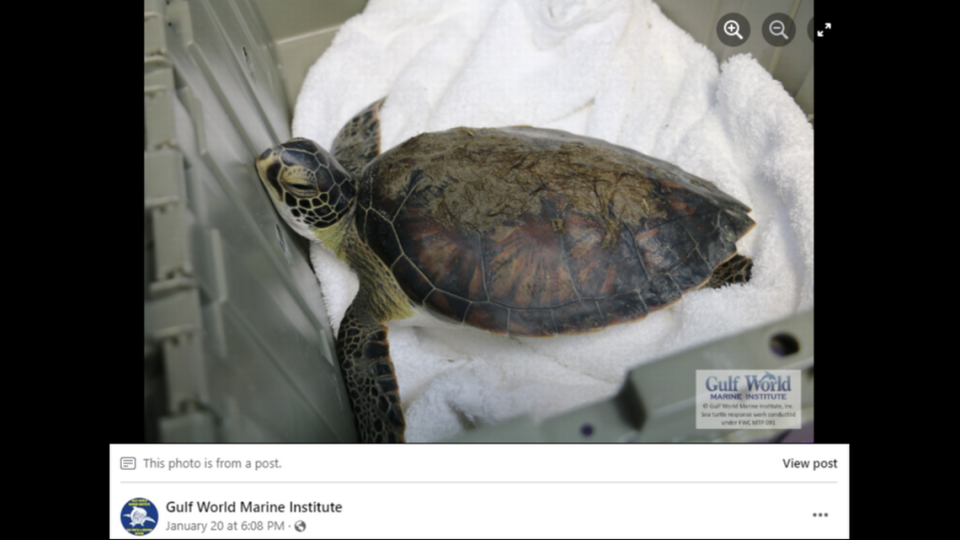Dozens of frozen creatures wash up on Florida coast. See them head back to sea
A recent cold snap made many Floridians put away their shorts and flip-flops and pull out their jackets and hats.
But some Florida residents don’t have the luxury of a winter closet.
As temperatures on land dipped in January, so did the temperature of the water in the Gulf of Mexico, leaving cold-blooded sea turtles in dire straits.
Cold-stunned turtles, or turtles that have become immobilized because their internal body temperature is too low, started to appear along the Gulf Coast, the Gulf World Marine Institute said in a Jan. 20 Facebook post, and they were in need of rescue.
Conservation and animal rescue groups brought the stunned turtles to the marine institute where they were evaluated, staffers said.
“After they get an initial admittance exam, their bodies are warmed up slowly from their initial temperature,” the marine institute said. “The turtles we have been receiving have been arriving with body temperatures in the low to mid 50s Fahrenheit.”

The institute said green sea turtles in their rescue area, which covers 137 miles of the Florida Panhandle coast, according to its website, are particularly prone to cold-stunning because of the seagrass beds that line the coast.
“Green sea turtles, as they age, shift from an omnivorous diet (eating both animals and vegetation) to a largely herbivorous diet (eating mostly vegetation). That vegetation diet gives their internal fat a greenish color, which is where their name comes from!” the institute said.
Over the next couple of weeks, the institute worked to slowly warm up the turtles and give them a safe place to recover.
In a Facebook Live on Jan. 23, an institute employee said when air temperatures drop below freezing, the water temperatures in shallower waters also drop.
Sea turtles are cold-blooded, like other reptiles, the employee said, which means “their body temperature is controlled by their environment.” When the water temperatures drop, sea turtles have no way of raising their body temperatures on their own.
The main organs of the turtles are able to continue to function so they stay alive, but the rest of their bodies become extremely lethargic, or slow, to conserve energy, the employee said in the video.
When their bodies can’t move, the sea turtles will float to the surface, according to the employee, where they are found by boaters or wash up on shore.
The animals aren’t sick or injured, so once they have warmed up and the temperatures have reached a high-enough level, they can be released back into the ocean.
On Jan. 30, the institute did just that and released 40 previously stunned turtles into the Gulf.
“Whenever they’re flipping and they’re angry, we want that,” Lauren Albrittain from the Gulf World Marine Institute told WJHG. “It means they are very fueled up and ready to go. Again, these turtles by and large are healthy [and] chunky, you saw fat turtles that are just a little too cold so we can warm them up. They got plenty of energy to get back out there and do what they do best.”
More than 1,000 people stood along the beach of Salinas Park in Port St. Joe to catch a glimpse at the unique ocean creatures and wish them well on their next journey, the institute said.
Sea turtles big and small were picked up from their travel boxes and carried to the water where they put their little flippers to work and headed back out to sea.
“What a beautiful day to go home,” St. Joseph’s Bay volunteer Kendra Jacoby told WJHG. “It is just very amazing and exciting to see the sea turtles because they’re pretty exclusive.”
Port St. Joe is about 100 miles southwest of Tallahassee.
109 sea turtles found paralyzed on Outer Banks beach in NC. Only 36 survived the day
‘600 pound babies’ return to Florida waters after rehabilitation. See their release
Are dolphins bullies? Researchers — and manatees — don’t buy their lovable reputation
Curious shift in ocean currents is having chilling impact on Outer Banks, experts say

